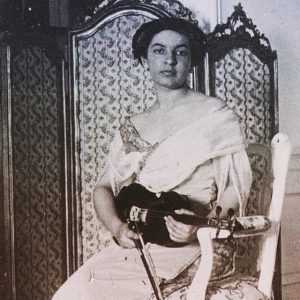
“Let it [our child] develop like a plant, and if it has some great talent, give it everything to encourage this talent; above all, give it freedom, when it seeks it […] and so act the same way if it is a boy or a girl; every talent, every genius, requires equal consideration, and sex cannot be allowed to come into the matter.” – Pejačević in a letter to her husband, October 1922
How many Croatian composers do you know of? Here is one to explore: Dora Pejačević (1885-1923), who wrote 58 works for us to play and listen to today. Pejačević’s CV is long: composer, pianist, violinist, actress, countess and raging socialist, patron of the arts and artists.
Born in Budapest in the country that was then Austria-Hungary. The family moved to Zagreb where she began private studies in violin, music theory and instrumentation for the professors at the Croatian music academy. She then continued her education in Dresden and Munich, still as a private student but for the major professors of these cities. Wherever she went, her music was also performed, not only in the beforementioned cities but also in Vienna and Prague. In 1918, the Croatian music institute even held a showcase concert with music only by her. Her symphony was performed many times during her life, always with fantastic reviews.
Her music is late romantic, but you can hear a clear development in style from her early pieces to her later. She was very against the concept of program music, however touching on it in e.g. her piano pieces on flowers op. 19.
During her lifetime, the world she came from changed dramatically both politically and socially, and the advantages in being born a duchess vanished completely. She also volunteered as a nurse during WW1 and experienced the change from this perspective too.
Sadly, she passed away already at age 38 following complications that arose after giving birth to her son, and left sketches to another symphony, music for male choir, a prelude for orchestra etc. After her death she was performed less and less, however after the celebrations of the centenary of her birth (1985) her music is now heard quite often, especially in eastern Europe. 1993 there was also a film made, Countess Dora, loosely based on her dramatic life.
Recommended listening:
- Wind players have many juicy solos to look forward to if they get the chance to play her Symphony in f sharp minor op. 41
- Her piano concerto op. 33 is said to be the first Croatian solo concerto
- Canzonetta for violin and piano, among other beautiful smaller pieces
- The piano trio op. 29!
- A totally different character is the Ouverture for orchestra op. 49
- Many of her lieder seem to be for alto voice, a tip for all you altos.
- And of course the beloved cello sonata op. 35
More info here and some sheet music can be found here.
